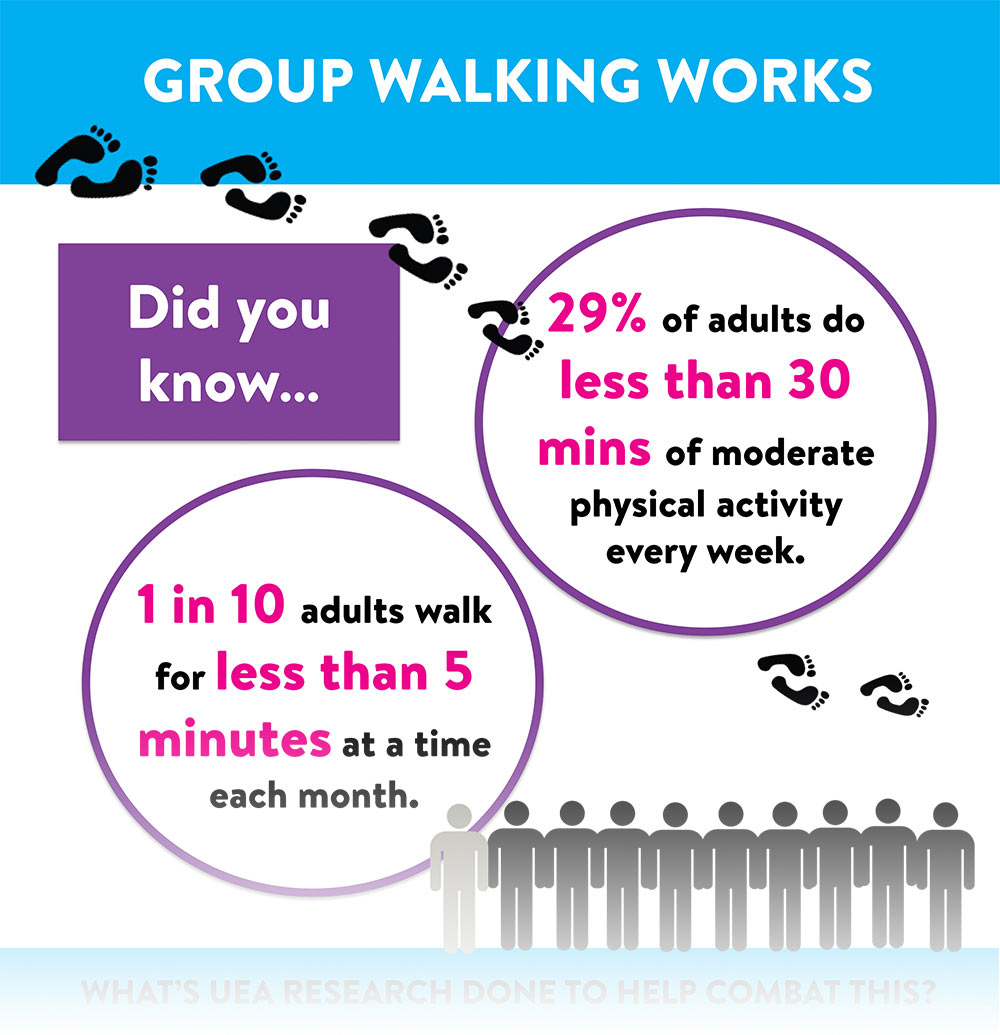)


UEA research focused on the importance of group walking for helping us cut our risk of life threatening conditions.
Strokes, heart disease, depression and many other life-threatening conditions could be reduced by regular outdoor walking in groups says UEA research.
It was found that people who walked in a group regularly had low blood pressure, resting heart rate and total cholesterol. Walking was also shown to reduce body fat and Body Mass Index (BMI).
Click on image to see full infographic:

In England, at least 29% of adult do less than 30 minutes of moderate physical activity every week, and almost 1 in 10 don’t manage to walk for more than 5 minutes at a time over a month. But with a method that is very cost-effective and is a low-risk way of improving overall health, this could be an ideal solution to these statistics.
Dr Sarah Hanson led the research in this study. Hanson commented:
"Our research shows that joining a walking group is one of the best and easiest ways to boost overall health. The benefits are wide ranging - and they go above and beyond making people more physically active. What's more, people find it relatively easy to stick with this type of exercise regime.
The merits of walking - including lowering the recurrence of some cancers - are well known, but these findings show that the dynamics and social cohesion of walking in groups may produce additional advantages.
People who walk in groups also tend to have a more positive attitude toward physical activity, a shared experience of wellness, and say they feel less lonely and isolated. Taking regular walks can also be a catalyst for adopting other healthy behaviours.
The research evidence suggests people enjoy attending walking groups and appear less likely to drop out than many other forms of activity.
The research evidence suggests people enjoy attending walking groups and appear less likely to drop out than many other forms of activity.
Walking is safe and walking groups could provide a valuable line of treatment, with a potential for both physiological and psychological health benefits," she added.
The research team reviewed 42 studies, totalling to 1,843 participants in 14 different countries. They looked at 74 hours of group walking which included people with obesity, heart disease, type 2 diabetes, fibromyalgia, Parkinson’s disease, as well as health participants.

The findings were as follows:
People who joined walking groups registered statistically significant falls in average blood pressure, resting heart rate, body fat, weight, and total cholesterol. Walkers also experienced improvements in lung power, overall physical functioning, and general fitness, and they were less depressed than before they started walking regularly.
Evidence was less clear-cut for reductions in other risk factors for ill health, such as waist circumference, fasting blood glucose and blood fats.
Three-quarters of all participants stuck with the group, and there were few side effects, apart from a handful of falls on roots or wet ground, and minor injuries such as calf strain.
Hanson said: "These findings may provide clinicians with evidence of a further effective option to recommend to those patients who would benefit from increasing the amount of moderate-intensity physical activity they do.
One way to promote and sustain walking is through the provision of outdoor health walk groups, schemes which typically organise short walks of under an hour in the natural environment.
For example the 'Walking for Health' scheme, run by the Ramblers and Macmillan Cancer Support, is England's largest network outdoor group walks, with 70,000 regular walkers, 10,000 volunteer walk leaders and approximately 3,000 short walks offered every week around the country."
Jackie Hayhoe, programme manager for Walking for Health, said: "Walking really works. Every day we see the positive impact this simple activity has on the thousands of people who regularly take part in Walking for Health group walks. We're delighted to see further evidence to support what we see on the ground - that walking with others adds to the many health and well-being benefits regular walkers see.
As the evidence mounts, we'd like to see more local authorities, clinicians and public health professionals supporting and recommending walking groups in their local areas."
RELATED PUBLICATIONS
www.sciencedirect.com/science/article/pii/S1353829216000290
www.sciencedirect.com/science/article/pii/S0277953616305421